As the sun sets-this scene has some of the nicer lighting in the movie by the way-Drinian announces that the Dawn Treader has reached the Lone Islands, specifically the port of Narrowhaven. Caspian and Edmund look at the oddly still and silent town through a telescope.
Caspian: Strange. Not a Narnian flag in sight.
Edmund: But the Lone Islands have always been Narnia’s.[1]You may remember that the White Witch was the Empress of them back in The Lion, the Witch and the Wardrobe.
Drinian: Seems suspicious.
Edmund: I say we prepare a landing party. Drinian?
Drinian: Forgive me, Your Majesty, but the chain of command starts with King Caspian on this ship.
Awkward pause
Edmund: Right.
I don’t feel like that little moment was necessary. It basically serves to make it very clear there will be some sort of power struggle between Edmund and Caspian later in the story when it wouldn’t have hurt anything for it to be more of a surprise. Still, I don’t hate it or anything.

“We’ll use longboats,” says Caspian, “Drinian pick some men and come ashore.” Two longboats enter the harbor, leaving the Dawn Treader behind. Among the sailors in them are Caspian, Edmund, Lucy, Eustace and Reepicheep. “Onward!” cries the last one. “The thrill of the unknown lies ahead!” That’s kind of an odd thing to say at this point since the Lone Islands are technically part of Narnia though not one that any of the characters have visited recently, making them somewhat unknown but not nearly as much as the unexplored lands the voyagers will see later. In the book, Reepicheep says, “it is after the Lone Islands that the adventure really begins.” But maybe I’m just nitpicking. “Couldn’t it have waited till the morning?” Eustace gripes. “There is no honor in turning away from adventure, lad,” replies Reepicheep. Let me take this moment to applaud the screenwriters. That definitely sounds like something the book’s Reepicheep would say. Well, I could argue his position ends up being a little more nuanced than that[2]Reepicheep did surprisingly advocate nonviolent solutions in two scenes in the book though neither of those counted as “turning away from adventure” and in the last chapter, he chided … Continue reading but that would really be overdemanding of me. “Listen!” says Lucy. “Where is everyone?” This would be a good moment to pause and take in the suspicious silence, but I fear the movie is a little too fast paced for that. “Come on, Jellylegs,” says Reepicheep, extending a paw to help Eustace out of the boat. “I’m quite capable of doing it myself,” says Eustace, stumbling and hurting himself on the stone steps. Reepicheep rolls his eyes. “And you’re certain he’s related by blood?” Caspian asks Lucy as he looks back at Eustace. I feel like that line would be a lot funnier if Caspian said it in a mischievous whisper for only her and Edmund to hear. As it is, he sounds kind of like a jerk. This whole situation was quite different in the book, almost the opposite. There the kings and queen suspected nothing amiss in the Lone Islands and decided to take a little stroll on the most sparsely populated of them before going to Narrowhaven. (“If Caspian had been as experienced then as he became later on in this voyage,” the books tell us, “He would not have made this suggestion; but at the moment it seemed an excellent one.”) They invite Eustace to join them out of politeness and he accepts because he’s desperate to get off the ship. As it is in the movie, there’s no reason why Eustace should be part of this potentially dangerous spy mission but do not question his presence! He’s the best part of this section by a long shot.
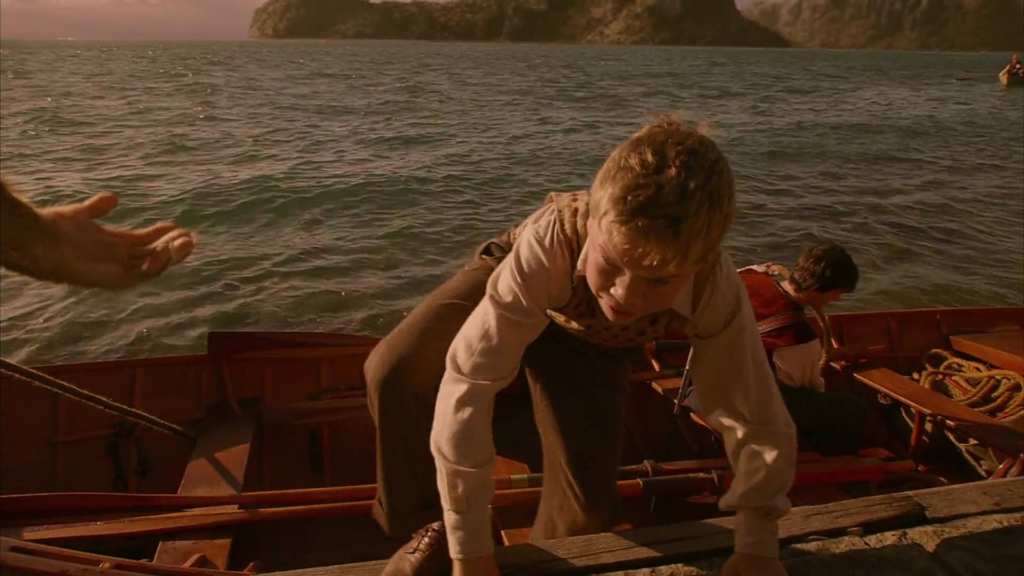
A loud bell clangs in a nearby tower, scattering some birds. Caspian automatically aims a crossbow at it. As the noise dies down, he collects himself. “Reepicheep,” he says, “stay here with Drinian’s men and secure the place. If we don’t come back by dawn, send a party.” I’m not sure why he can’t take Reepicheep, as well as a few other people besides Edmund, Lucy and Eustace-Eustace for crying out loud! I understand he doesn’t want to endanger everyone at once but there’s such a thing as strength in numbers too. Oh well. The three monarchs and Eustace explore the seemingly abandoned port town. I do basically like the design of it by the way. Eustace peeks through the window of a house and sees a family huddled together in fear.

Hilariously, his reaction to this is to say to the others, “Yeah, looks like nobody’s in, so do you think we should head back?” This part of the movie really plays up the character’s cowardice whereas the book played up his whininess more but that’s not a huge change. (It’s not like he hasn’t whined at all recently.) But the others want to explore the bell tower. Edmund, wanting to get Eustace out of the way, invites him to cover and “guard something.” Not wanting to explore the mysterious building, he gladly accepts. Caspian wordlessly hands him a knife. “I’ve got it, I’ve got it,” he babbles, “Don’t worry.” After his cousins have been inside for a few seconds, he calls, “I’m ready to go when you are.”
The interior of the tower turns out to be a pretty cool set. It’s dusty and cavernous and features ancient headless statues.

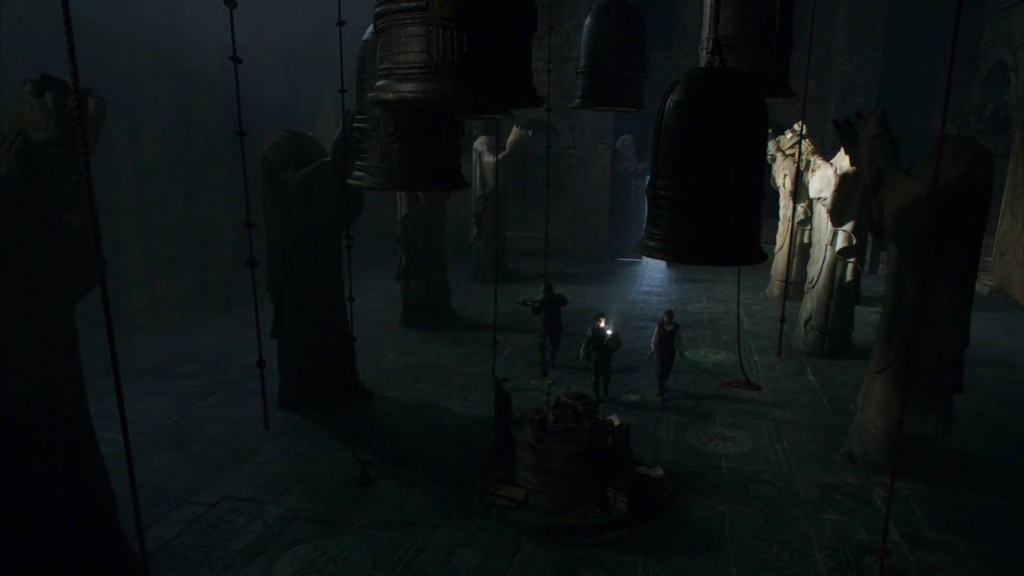
In the center of the room, stands a table with an official looking book on it. Edmund shines his torch on the pages, illuminating a list of names.

Lucy: Who are all these people?
Edmund: Why have they been crossed out?
Lucy: It looks like some kind of…fee.
Caspian (grimly): Slave traders.
Just then, the bells ring again. Men with weapons slide down the ropes, and a fight ensues. Again, this pretty different from the book. There, Caspian and company find the slave traders picnicking in a meadow and it’s only then that it occurs to him that there might be danger here. I prefer the way the book does the scene as the villains are more of a surprise. It’s pretty obvious from the start of the movie’s scene that something bad is about to happen to the main characters. Still, this isn’t the worst change you could make to the story. Anyway, the fight is interrupted by a blood curdling shriek. My first thought, watching the film, was that a woman had just been gruesomely murdered. Everyone turns to see one of the attackers (Colin Moody) holding Eustace and pressing a knife against his throat. “Unless you want to hear this one squeal like a girl again,” he says, “I’d say you should drop your weapons.”
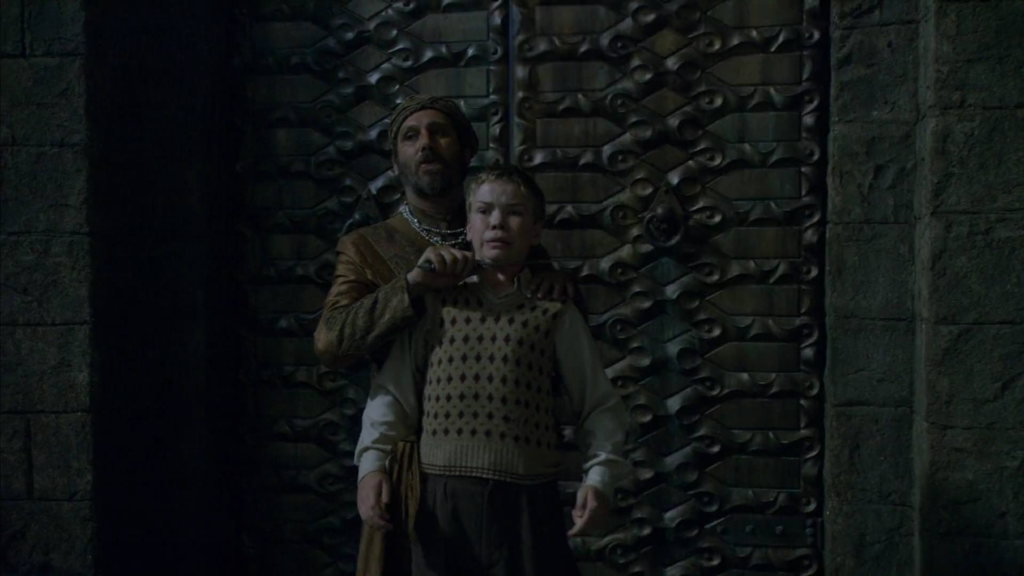
Caspian, Edmund and Lucy reluctantly comply. “Put them in irons,” says the man. “Let’s take these two (Eustace and Lucy) to market. Send those two (Edmund and Caspian) to the dungeons.” Now in the book, Caspian insists that no one tells the slave traders his true identity lest they kill him to save themselves from the penalty of capturing the king, so I’m not exactly thrilled that the first thing the cinematic Caspian says as he’s being cuffed is “Listen to me, you insolent fool! I am your king!” Naturally, his captors don’t listen. One of them strikes Edmund in the face. “You’re going to pay for that!” he snaps. “Actually, someone else is going to pay for all of you,” says another man (David Vallon), one in slightly fancier clothes, stepping out of the shadows. At first, I assumed this was supposed to be Pug, the leader of the slave traders in the book. It turns out he’s actually a combination of him and Governor Gumpas, another character. In the book, Gumpas wasn’t really leading the slave traders. His crime lay in allowing the illegal slave trade in the Lone Island on the grounds that it boosted the economy by drawing tourists or something like that. In the movie, it seems like the slave traders have somehow taken over the government of the Lone Islands themselves. It’s really not explained clearly.

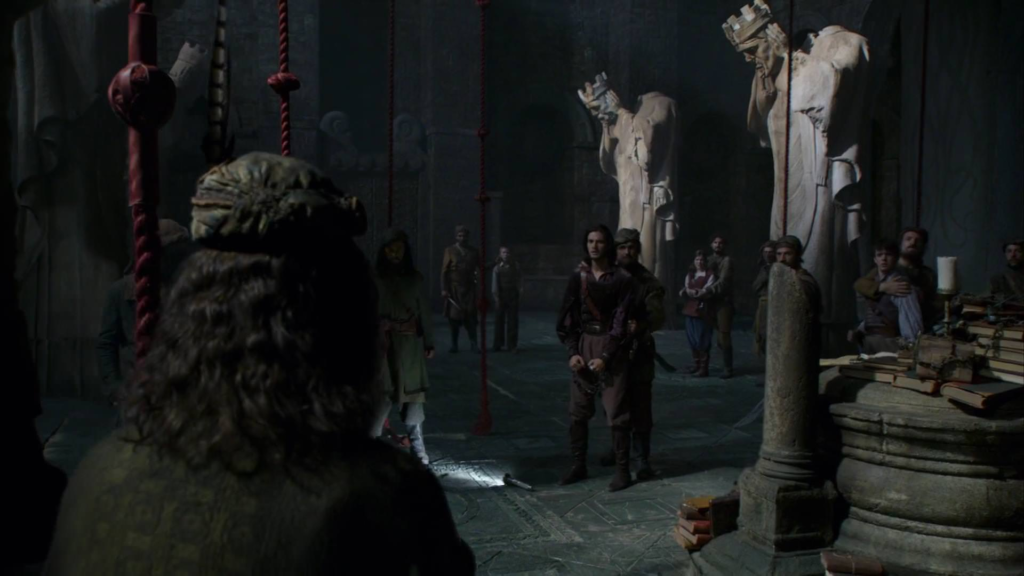
Edmund wakes up the next morning in a dungeon to find Caspian angrily kicking the iron door to no avail. Again, the adaptation is making Caspian look hotheaded and pathetic rather than calm and capable as he is at this point in the source material. “It’s hopeless,” says a weirdly calm voice in the darkness, “You’ll never get out.”[3]I don’t mean that “weirdly calm” bit as a criticism. I believe the voice is supposed to sound weirdly calm. “Who’s there?” Edmund demands. “Nobody,” says the voice, “Just a voice in my head.” Caspian investigates and finds another prisoner (Terry Norris), an old man with wild, overgrown hair and very wide eyes.
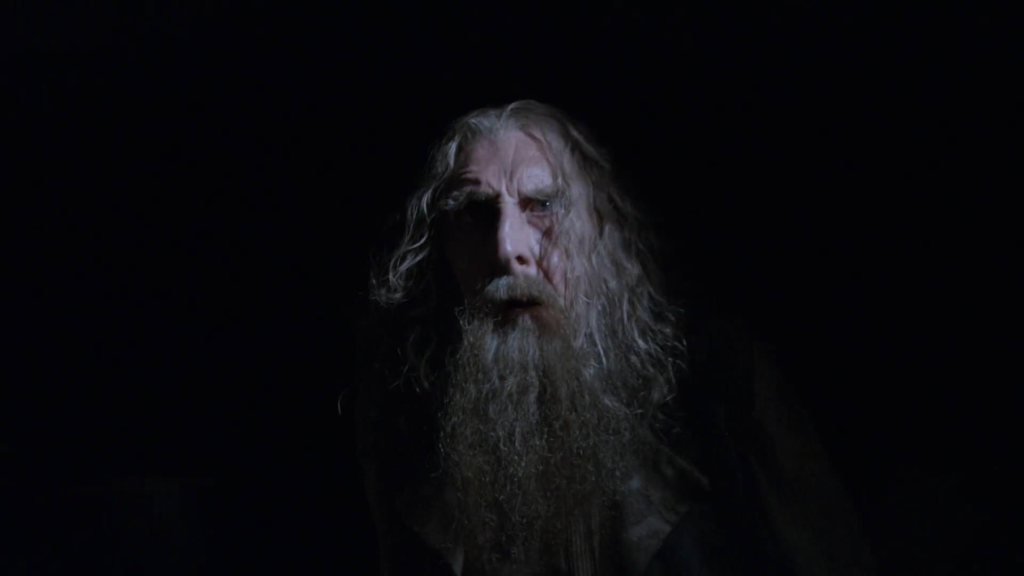
He recognizes him. “Lord Bern?” he says. “Perhaps once,” says the prisoner sadly, “but I’m no longer deserving of that title.” Edmund asks if this is one of the seven missing lords, which it is of course. Bern studies Caspian’s face. “You remind me of a king I once loved well,” he says. “That man was my father,” Caspian says. Bern cries and kneels before Caspian, begging for forgiveness. Caspian helps him up. In the book, Lord Bern is not a pathetic old prisoner but a free and prosperous man who has settled down on the island of his own free will. He buys Caspian from the slave traders out of compassion and because Caspian reminds him of his old friend, Caspian’s father. I love the irony of the slave traders unknowingly helping Caspian in his quest and bringing about their own destruction by selling him to Bern, so I’m not happy about this alteration.
Edmund hears screaming from outside. He looks out the dungeon window and sees a cart full of prisoners being driven through the streets. A man (Arthur Angel) and a little girl (Arabella Morton) are running after it. The man manages to grab onto the end of the cart but one of the slave traders roughly knocks him to the ground. “Mummy!” howls the girl. “Stay with Daddy!” yells one of the women in the cart (Rachel Blakely.) All this is witnessed not just by Edmund but by Lucy and Eustace who are tied up with some other captives, waiting to be auctioned off in the slave market. “Don’t worry! I’ll find you!” the fallen man calls to his wife. She and the other prisoners on the cart are hustled onto a longboat. Caspian has now joined Edmund at the dungeon window. “Where are they taking them?” he asks Bern. “Keep watching,” Bern replies.
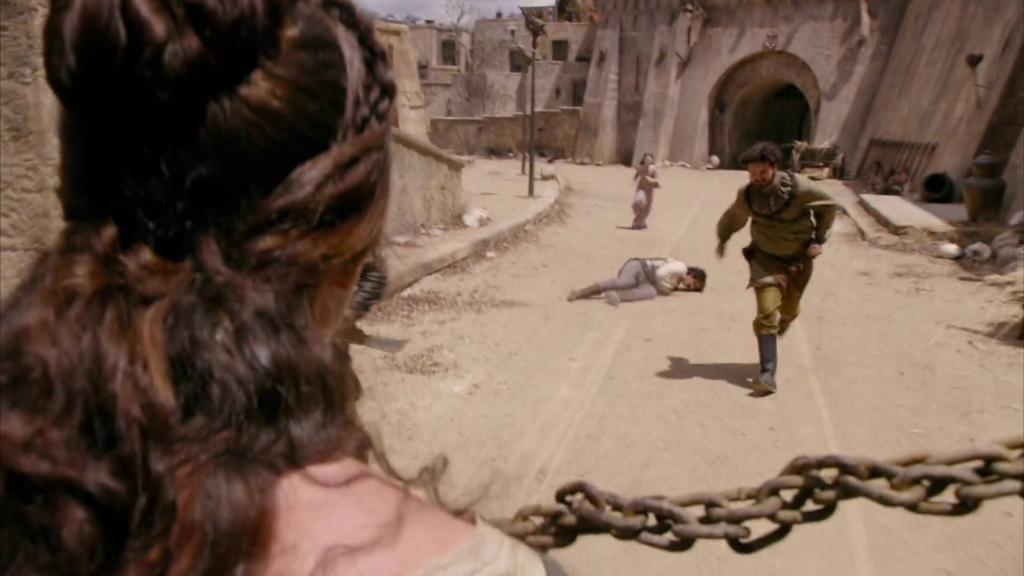
On my first viewing, I assumed that this little scene was just supposed to demonstrate the cruelty of the slave trade, but it turns out to be something less mundane. Suddenly, the bright blue sky darkens, and clouds swell ominously. It’s common of course for the weather in movies to reflect the dramatic situation but this looks a little ridiculous. That’s because it’s magic. Suddenly, a glowing green mist appears in the harbor. No, this is not a surprise appearance by the Time Warp Trio. (We should be so lucky.)

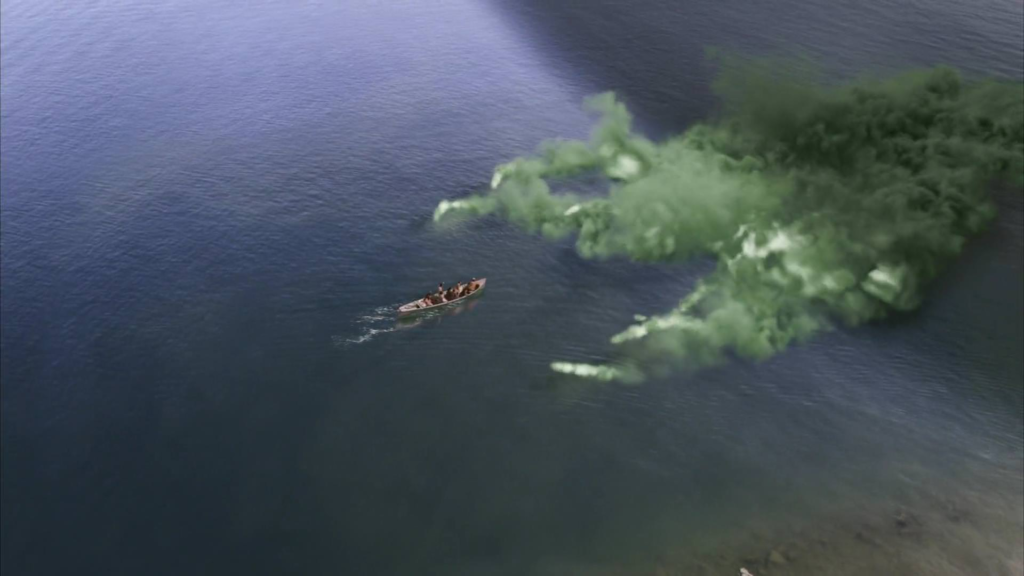
The mist bounces around-I can’t think of a better description than that-in wisps, enveloping the boat full of screaming people. It dissipates as swiftly as it appeared, leaving nothing behind.
Caspian: What happened?
Bern: It’s a sacrifice.
Caspian: Where did they go?
Bern: No one knows. The Mist was first seen in the east. Reports of fishermen and sailors disappearing out at sea. We lords made a pact to find the source of the Mist and destroy it. They each set sail. But none came back. You see, if they don’t sell you to the slave traders, you’re likely to be fed to the Mist.
Edmund: We have to find Lucy! Before it’s too late.
That explanation of Bern’s really raises as many questions as it answers. How did the slave traders realize that they needed to appease the Mist by sacrificing people to it? Can it communicate with them somehow? How? And why can’t they just avoid the Mist by staying away from the east and fishing elsewhere? What’s this distinction Bern makes between the slave traders and “they?” (He speaks of Caspian and Edmund being sold to the slave traders, not the slave traders selling them.) Is the governor of the Lone Islands collaborating with the brigands as I’ve suggested? Why aren’t any of these important characters given names? Exposition has never been a strong suit of these movies, the worst example being in Prince Caspian when the Telmarines brought Trumpkin to be executed at Cair Paravel with no explanation rather than executing him right where he was. But at least with the other two movies, I could follow the plot by reading the book, not that that excuses the screenwriters. Here, I’m totally at sea. And rescuing the Lone Islanders devoured by this mysterious Mist ends up being one of the story’s main goals, so it’s rather annoying that the circumstances of their sacrifice are so vague.
That’s not to say the Mist is completely original to this adaptation. What the filmmakers have done is taken the Dark Island, one of the islands the voyagers discover in the book and easily the scariest one, given it a mind of sorts and made it a villain who is a constant threat to the characters throughout their voyage. I could maybe live with that. I feel that adding an overarching villain to the story[4]As opposed to a villain who only shows up at one island. distracts from the quest for Aslan’s country but an adaptation that made the change could still tell a good story in its own right and making the Dark Island a villain is probably better, from a book fan’s perspective, than inventing an original baddie. But did they have to make it green?! Why not have it be dark like in the book?[5]The reason for the color change, from what I’ve gathered, is that in early drafts of the script, The Lady of the Green Kirtle, the villain of another Narnia book, was behind the Mist. I’m … Continue reading Don’t get me wrong. Pale green can be an effectively eerie color. One of my favorite fantasy movies, Disney’s Sleeping Beauty, uses it to great effect in one of its most memorable scenes. But it works best against a dark background, not a bright blue one. The filmmakers seem to have realized this hence the sudden change in the weather that heralds the Mist’s presence in this scene. But that didn’t help. When the Mist appears in this scene, it looks like a cartoon skunk farted. The weird, bouncy way the Mist is animated also makes it look more silly than creepy.[6]The tendrils of smoke actually look a little like the skipping stone in Walden Media’s logo. Was that intentional?! I believe that adaptations can include things that aren’t from the source material but are great in their own ways. The Mist is not one of those.

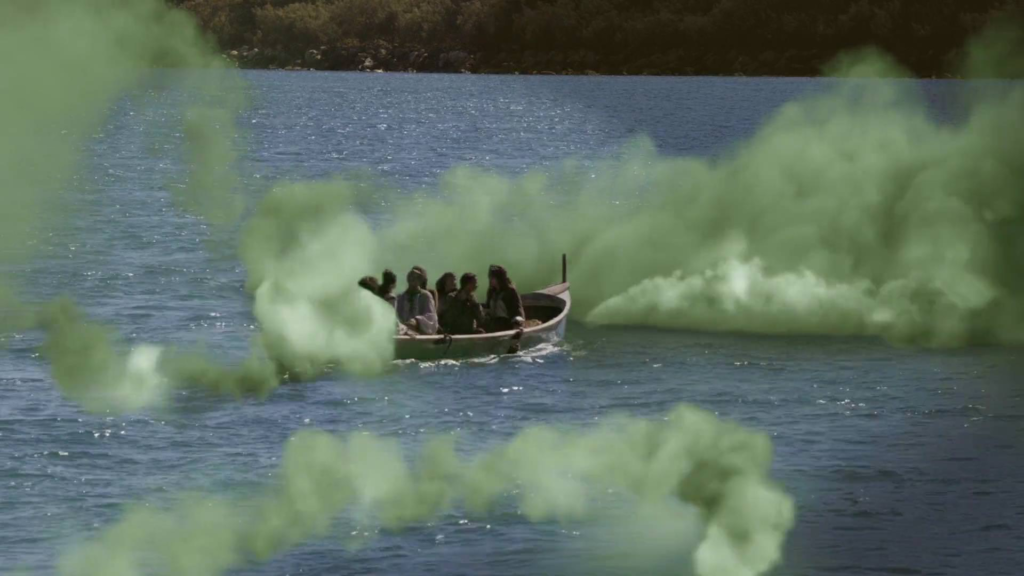
We cut to Lucy being auctioned off at the slave market. I assume the merchants bidding on her are from Calormen as they are in the book. Now the Calormenes from the Narnia books have been criticized for embodying negative stereotypes of Middle Easterners and you’d expect filmmakers to be worried about how to depict them. Apparently not the filmmakers who made this movie though. The costumes the bidders sport are quite stereotypically Middle Eastern. What offends me here isn’t any possible racism but how boring and generic those costumes look. Whether adapters want to lean into the whole Middle Eastern flavor of the Calormenes or whether they want to steer away from it, they should look cool. The book describes them as “a wise, wealthy, courteous, cruel and ancient people.” Maybe you find that description racist, but you’ve got to admit it sounds cool! These Calormenes do not look cool, which is disappointing since this is the only glimpse of their culture Walden Media’s Narnia movies would give us. And costume design had been a strength of the series too.
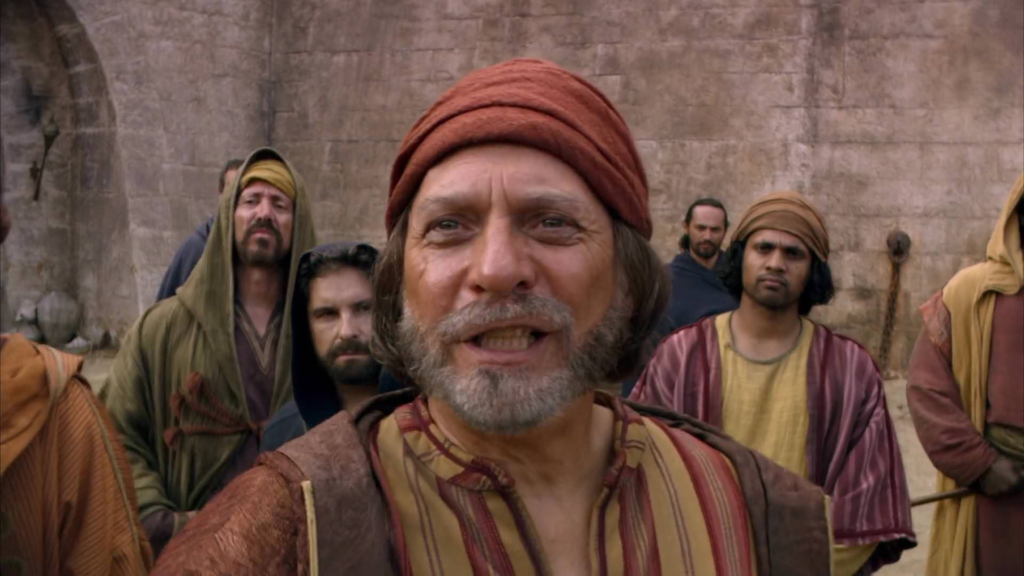
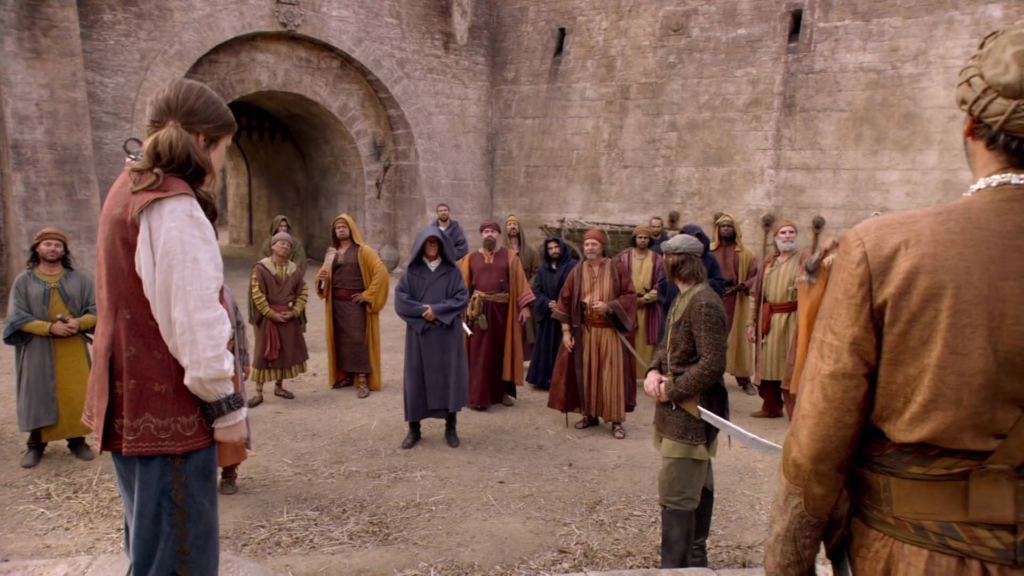
While Lucy is sold, Edmund and Caspian are also hustled out of their cell, their hands tied. Bern is too though we don’t see him clearly yet. Eustace is up for auction now. “Who’ll kick off the bidding?” asks the auctioneer, who’s also the one who captured Eustace by the way. Nobody responds.
Auctioneer: Come on now. He may not look like much but, uh, he’s strong.
Man in Crowd: He’s strong all right! Smells like the rear end of a minotaur.
Eustace: That is an outrageous lie! I won the school hygiene award two years running!
While that specific dialogue isn’t from the book, nobody wanting to buy Eustace is and I love that it’s included here. “I’ll take him off your hands,” says a familiar voice in the crowd, “I’ll take them all of your hands!” A man in the crowd pulls off his head revealing himself to be Drinian and the speaker, Reepicheep, to have been under that hood. “For Narnia!” cries the mouse and others in the crowd pull of their hoods and start fighting. It’s the rescue party from the Dawn Treader. The man leading Caspian and Edmund away is distracted by the melee, giving a still handcuffed Caspian the opportunity to knock him out.
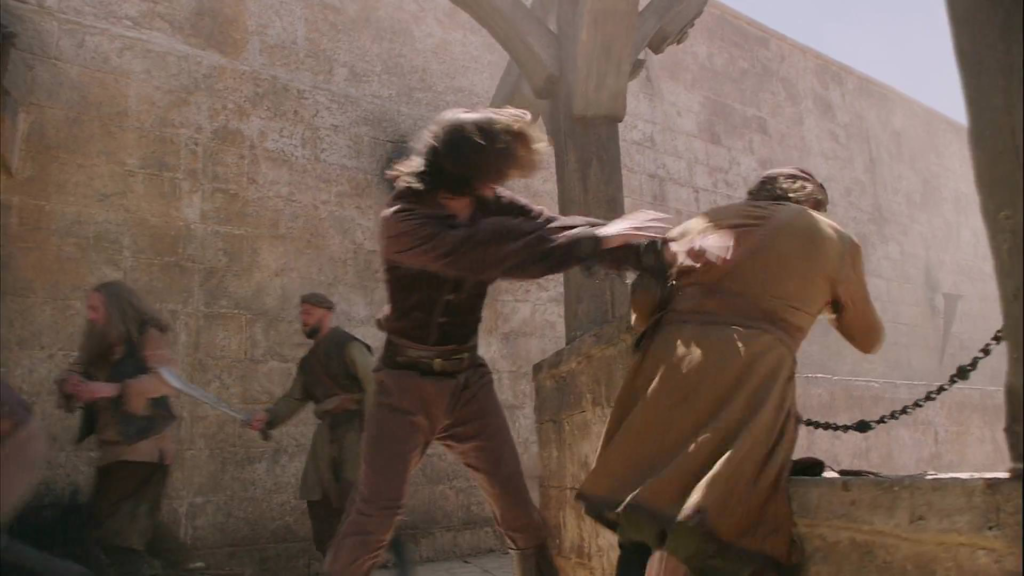
Edmund overpowers his guard, allowing Bern, who wasn’t handcuffed for some reason, to get his keys and toss them to Caspian. The terrified Eustace also manages to snag some keys, free himself and sneak away from the fight which other slaves and sympathetic Lone Islanders have joined. The leader of slave traders, whom I might as well call Gumpas to make this easier, also slips away with all the money he can carry. In the book, the Dawn Treader didn’t have enough men to rescue the slaves this way. They hadn’t known they’d need an army when they set out after all. Instead, Caspian and Bern tricked the bad guys into thinking they were a greater force than they were by things like having the ship fly all its flags and hang out its shields, all its fighting men appearing in full armor and send signals to a nonexistent fleet. It may not sound very gripping in summary, but it made for a really funny section in practice. It’s galling for me as a fan to see the movie throw it all in the garbage and replace it with this rather silly action scene. Even if they wanted this part to be suspenseful rather than humorous, the book’s version could have been that too with just a slight twist of emphasis and anyway, this scene in the movie is pretty comedic too. I guess they tried to stay true to spirit of the book by having the rescue party use trickery with their disguises. But, honestly, did the characters even need to do that? Conceal their weapons, yes, but disguises? The implication was that people came to the slave auctions from outside the islands. Drinian and company would have been seen as potential customers, not potential slaves. Reepicheep frees Lucy and she joins the fight. I expressed regret that Lucy took so little part in the action scenes in the last movie when it would have been much more in keeping with her character in the books than it was for Susan’s. I wanted to see her in more action scenes but not like this!
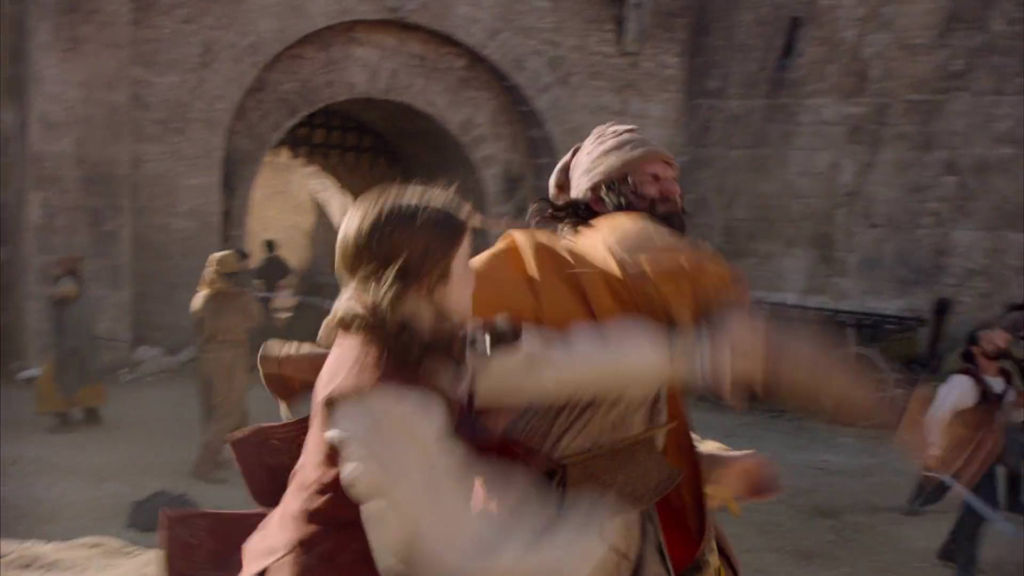
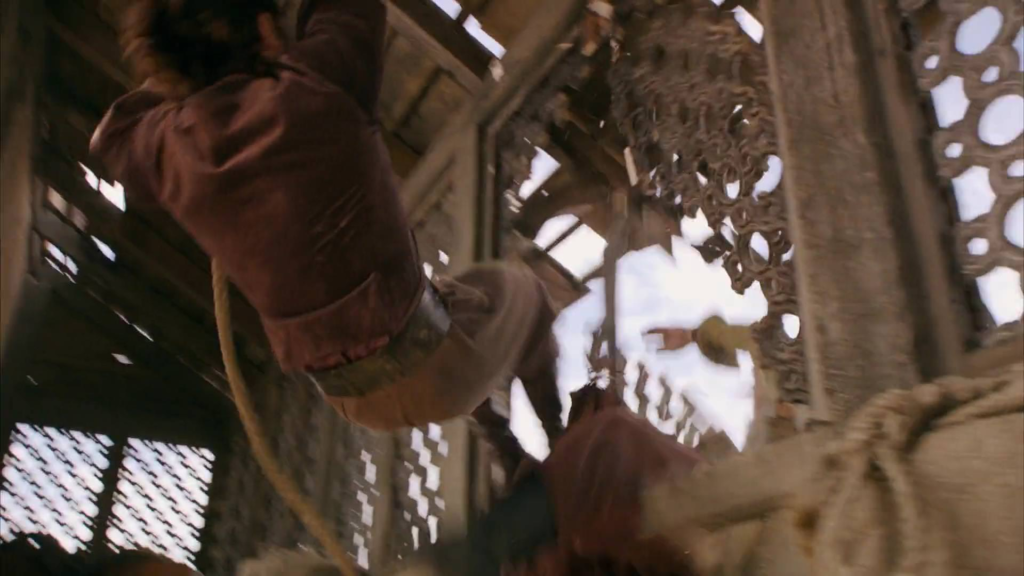
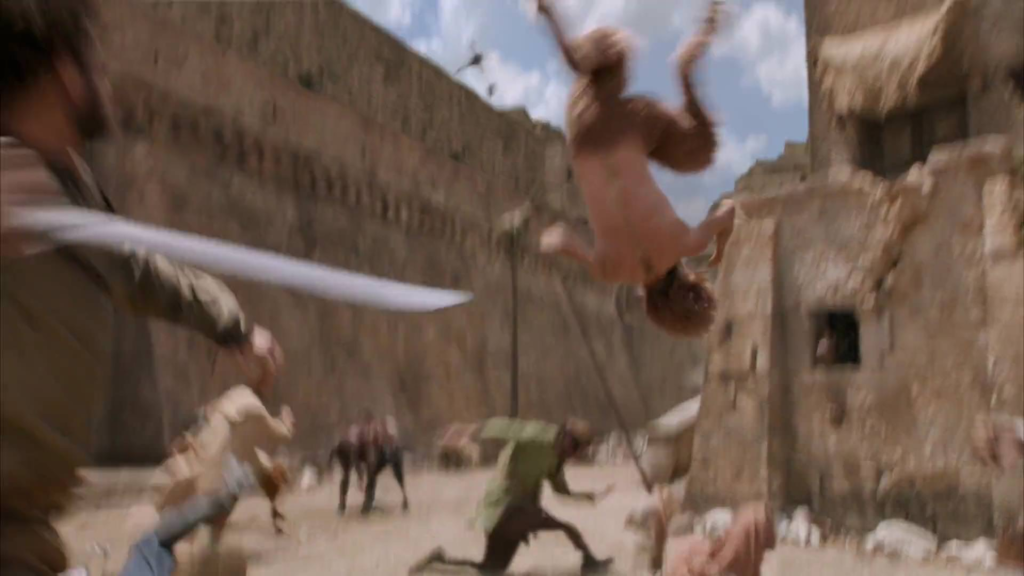
I know, I know. I should really write about how this action scene works on its own terms instead of just complaining that it’s untrue to the book. It’s…not terrible, I guess but I feel like the battle scenes in the first two movies were better. I feel like it’d work better if we knew more about these villains and could enjoy seeing the good guys trounce them more. To be fair, the book’s version required a good amount of exposition which might have felt weird to do in a movie for a conflict that would only last a few scenes. Still, I’d actually rather the Lone Islands section be completely cut from the story than adapted this way.
Anyway, Eustace makes it down to the harbor and gets into a longboat. He’s followed by Gumpas. Eustace looks helplessly down at the oars. “Oh, you’re a boat in a magical world,” he carps, “Can’t you row yourself?” Gumpas draw a knife and sneaks up behind him. Trying to balance a heavy oar in his hands, Eustace accidentally knocks him into the water. “Oh, God, I hope that wasn’t the British Consul!” he says. I love Eustace so much! He’s practically the only good thing about this part of the movie.
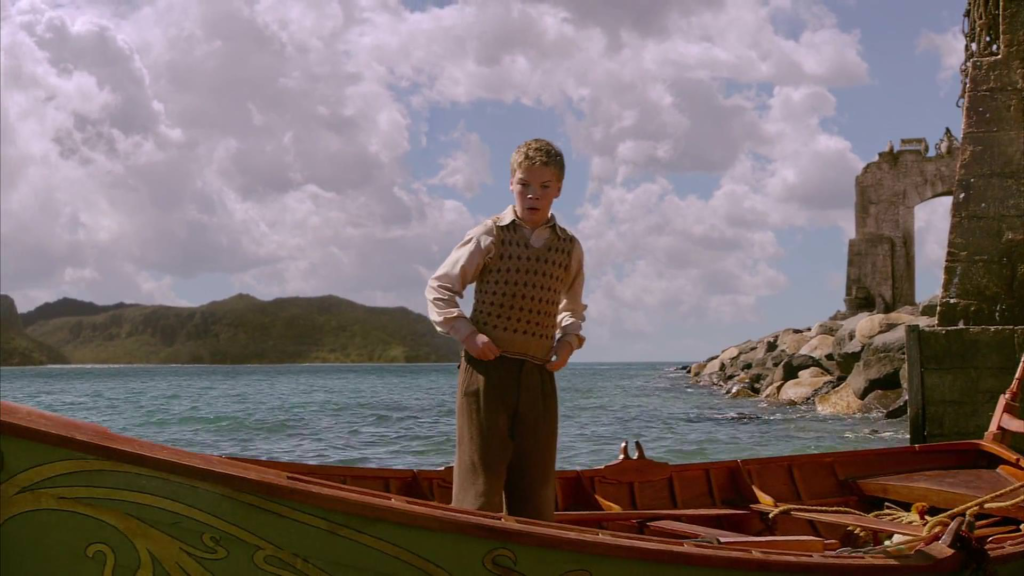
Even though this adaptation has completely flown in the face of the book with the scene just described, it could still mollify me by including the scene of Caspian confronting Governor Gumpas, stripping him of his power and making Lord Bern the Duke of the Lone Islands, some version of that scene anyway.
Some slight allusion to it at least.
No?
OK, then!
The victorious Narnians parade through the streets of Narrowhaven as the formerly oppressed people cheer. (It really would be nice to have that explained more clearly.) The desperate man we saw earlier, the one whose wife was fed to the Mist, runs up to Caspian, followed by his daughter and her aunt (Catarina Hebbard.) Drinian, acting as a bodyguard, gets in between the man and Caspian, but Caspian overrules him and allows the man to come forward.
Man: My wife was taken just this morning. I beg you take me with you.
Daughter: I want to come!
Man: No, Gael, stay with your aunt. (to Caspian) I’m a fine sailor. Been on the seas my whole life.
Caspian: Of course, you must.
Man: Thank you!
Daughter: Daddy!
Man: If I ever not come back…(he hugs her) Now be good.
A sympathetic Lucy observes this farewell.

So Caspian is now setting out to find and destroy the source of the Mist, hopefully succeeding where the six lords failed. Shouldn’t this scene feel more tense? Shouldn’t someone (probably Edmund) ask Caspian how they know the Mist isn’t just going to devour them before they get near it? And shouldn’t Caspian say something along the lines of “I don’t know but we have to try to help?” Instead, except for this little bit with the family, the mood of the whole scene is triumphant and even that bit goes by too quickly to have much emotional impact. Mind you, in the book, the crew of the Dawn Treader definitely left the Lone Islands in a triumphant mood so I’m actually asking the adaptation to be less like the book here. But if they’re going to change the story so that the crew is now dealing with a mysterious threat about which they know little, shouldn’t that lead them to changing the mood? It doesn’t really make sense otherwise.
As they’re about to board, the Narnians are met by Lord Bern, now much healthier looking. He hands Caspian an ancient, dirt encrusted sword.
Bern: This was given to me by your father. I hid it in a cave all these years.
Edmund: That’s an old Narnian sword![7]Don’t ask me how he can tell under all that grime. I’m stumped.
Bern: It’s from your golden age. There are seven such swords, gifts from Aslan to protect Narnia. (to Caspian) Your father entrusted them to us. Here, take it and may it protect you.
Um, weren’t the Telmarines enemies of Narnia? Why would Aslan give them magical swords (which aren’t from the book) to protect it?[8]To be fair, there are times in the book where C. S. Lewis seems to have forgotten the relationship between Telmar and Narnia in Prince Caspian. I mentioned the dryad thing in the last post. One of … Continue reading Of course, since Bern tells us these swords are from the golden age of Narnia when Lucy, Edmund and their siblings reigned, the implication is that Aslan didn’t specifically give the swords to the Telmarines. Apparently, Caspian’s father just found them somewhere. But how would he know what they were? Shouldn’t Edmund and Lucy be the ones explaining the significance of the swords to Bern rather than vice versa? Maybe when Caspian’s father entrusted the swords to the lords, the idea was that they would stop the swords from helping the Narnians and defeating the Telmarines. Not sure how they could do that if the swords were magical, but it’s the best explanation I’ve got.[9]I’d ask why Caspian IX didn’t just destroy the swords but later we’ll see that one of them is able to resist an enchantment that befell its bearer, so it’s not a stretch to … Continue reading Anyway, the crowd cheers. “Thank you, my lord,” Caspian says, “and we shall find your lost citizens.” Then he gives the sword to Edmund who stares at it in awe. Lucy smiles. Eustace just looks at Edmund like he’s nuts.
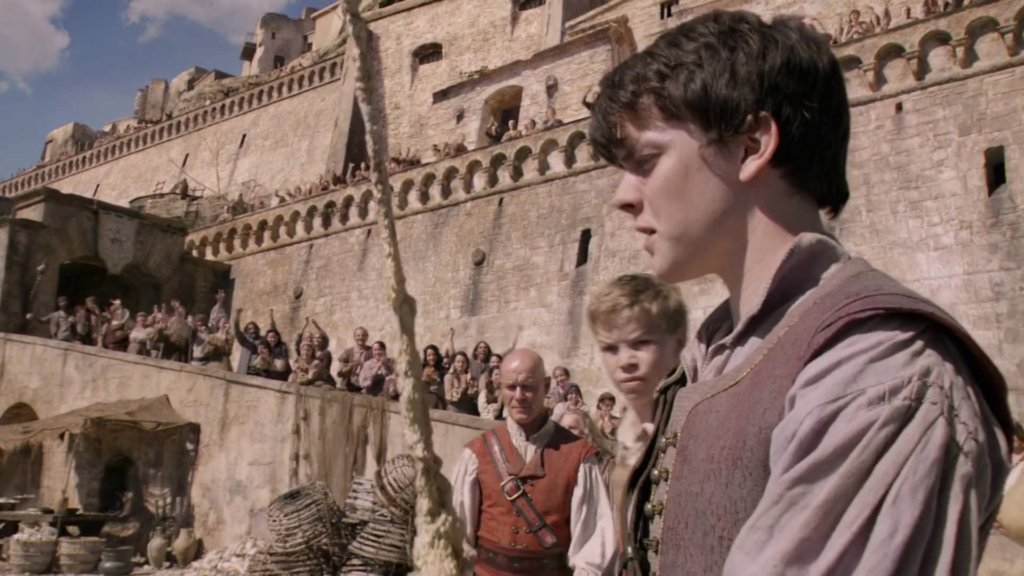
Next Week: There’s a Drain on the Dawn Treader’s Food Supplies-Two Drains Actually
References
| ↑1 | You may remember that the White Witch was the Empress of them back in The Lion, the Witch and the Wardrobe. |
|---|---|
| ↑2 | Reepicheep did surprisingly advocate nonviolent solutions in two scenes in the book though neither of those counted as “turning away from adventure” and in the last chapter, he chided Caspian that as a king, he can’t “please (himself) with adventures as if (he) were a private person.” |
| ↑3 | I don’t mean that “weirdly calm” bit as a criticism. I believe the voice is supposed to sound weirdly calm. |
| ↑4 | As opposed to a villain who only shows up at one island. |
| ↑5 | The reason for the color change, from what I’ve gathered, is that in early drafts of the script, The Lady of the Green Kirtle, the villain of another Narnia book, was behind the Mist. I’m glad they scrapped that since it would have departed from the spirit of the books. The only Narnia story to set up a villain who is defeated in another installment is The Magician’s Nephew and that’s because it was written as a prequel. I just wish they had removed every trace of the Lady of the Green Kirtle from the final film. |
| ↑6 | The tendrils of smoke actually look a little like the skipping stone in Walden Media’s logo. Was that intentional?! |
| ↑7 | Don’t ask me how he can tell under all that grime. I’m stumped. |
| ↑8 | To be fair, there are times in the book where C. S. Lewis seems to have forgotten the relationship between Telmar and Narnia in Prince Caspian. I mentioned the dryad thing in the last post. One of the missing lords also had Narnian coins in his pocket with images of lions and trees on them even though the Telmarines hated those things. I feel like those continuity goofs are easier to ignore than this sword thing since, as we’ll see, the movie’s plot hinges on it. |
| ↑9 | I’d ask why Caspian IX didn’t just destroy the swords but later we’ll see that one of them is able to resist an enchantment that befell its bearer, so it’s not a stretch to assume they’re indestructible. |

I like the movie in itself but I don’t like how they did not remain more true to the book and how they almost completely changed the story line especially around the Dark Island/green mist thing. I thought the Character of Eustace absolutely brilliant. He did such a good job.
Personally, I thought that since we do not know much about the dryaids in the book except they were asleep in Prince Caspian and that they can be tied up, and that they can marry humans, there could be a special circumstance were the trees and dryaids were falling asleep slowly which means that maybe the last one that wasn’t asleep was the one that spoke the song over Reepicheep when he was little. Then she fell asleep.
It seems odd then that Trumpkin would express incredulity at the idea of them. Wouldn’t Reepicheep and other Narnians confirm their existence? (You could argue that would still have been a problem even without the mention of the dryad in this story since we learn in The Last Battle, that centaurs and unicorns live a really long time.)